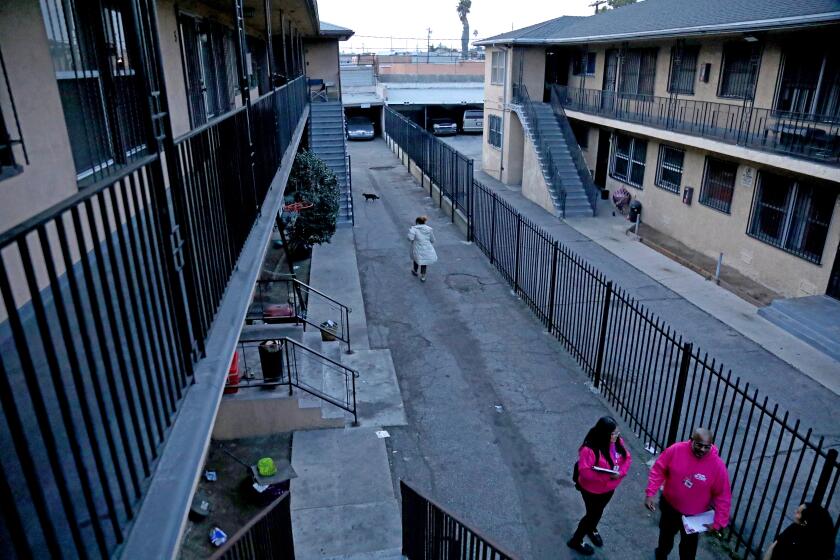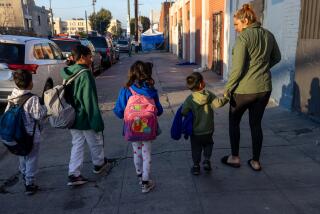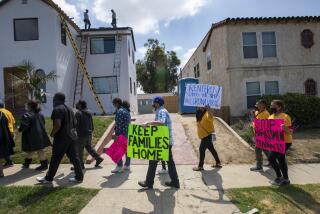L.A. tenants awaiting emergency rental assistance receive eviction protection

- Share via
The Los Angeles City Council adopted an ordinance Friday that prevents the eviction of tenants who are waiting to receive emergency rental assistance from the city.
The vote came one day after the deadline to pay rent debt accumulated during the COVID-19 pandemic.
More than 3,200 residents have been approved for the United to House L.A. Emergency Renters Assistance Program, which provides up to six months of unpaid rent for accepted applicants. Only 25% of the $30.4 million allocated for rental assistance has been distributed.
That means a significant number of renters who have been promised emergency funds have not yet received their money. Thousands more are waiting to hear if they have been approved for the program, which has received more than 31,000 applications.
Only those who have been approved will receive eviction protection.
Tenants should be aware of their rights and the local resources they can turn to now that many of the renter protections have expired.
Councilmember Eunisses Hernandez, who introduced the motion to draft the ordinance last week, said prevention is essential while fighting homelessness. She wants to stem the eviction-to-homelessness pipeline, she said.
“I don’t see us getting out of this homelessness crisis unless we as a city truly make transformational policy decisions around keeping people in their housing,” she said.
There are not enough funds to assist every United to House L.A. applicant — according to Los Angeles Housing Department data, there were $472 million in claims from applicants, nearly $454 million more than the total available. Applications closed in October.
It will take roughly 120 days from now for all applications to be processed. All applicants approved on or before May 31 will be protected from eviction, according to the draft ordinance the City Council voted to adopt Friday. Renters waiting to hear back will be at risk of eviction until their application is approved.
Eviction protection applies only if the sole reason for eviction is nonpayment of rent.
An earlier version of the motion that led to the ordinance would have protected all renters who applied for emergency funds regardless of their application status. Groups representing property owners raised concerns that this would lead to an indefinite delay of rent payments without the option to evict.
“We’re thankful that the council narrowed it down to a smaller pool of individuals who have been approved,” said Fred Sutton, senior vice president of local public affairs for the California Apartment Assn.
“But there remains the concern that this whole item was really rushed in a manner that isn’t acceptable,” he said.
Thousands of renters have been approved to receive financial assistance, but only a fraction of the funds have been distributed.
The City Council motion that prompted the ordinance was introduced Jan. 24 and approved Jan. 26. The ordinance was then drafted and adopted Feb. 2. Hernandez said it was necessary to move fast considering Thursday’s deadline.
Rental arrears from Oct. 1, 2021, to Jan. 31, 2023, were due Thursday, the same day rent increases became allowed for units that fall under the city’s rent stabilization ordinance. Tenants living in rent-stabilized units could see rent increases of up to 4%, or 6% if the landlord pays for gas and electricity.
“Housing is a human right,” Hernandez said. “For the Feb. 1 rent deadline to happen on the same day that rent increases take place, it’s just really sad.”
Amid the challenges renters face, Hernandez said she hopes this ordinance will provide the protection necessary to keep people off the street.
“With just a little bit of help, they will stay in their housing,” she said.
More to Read
Sign up for Essential California
The most important California stories and recommendations in your inbox every morning.
You may occasionally receive promotional content from the Los Angeles Times.













